Text
Final Thoughts on this Course:
I had a very good time in this class overall. I thought that the assignments were very reasonable. One comment I always have about assignments in other classes is that they seem to be full of so much extraneous information that would have me questioning what the point of the articles was. In this class, I always knew what I was expected to get out of each unit and each assignment.
The chat groups were very nice and helped me understand specific things that we were learning. I also enjoyed that I was always in three-person chat groups because I found that size to be just the right size to have enough to talk about for an hour. I enjoyed getting a week off when I didn’t have to summarize the chat group and I could just attend the chat and have a good time talking to my peers.
The assignments that were very open-ended added to my enjoyment of this class. Normally open-ended assignments fill me with anxiety, but the set up of this course ended up helping me work independently with little anxiety. In fact, I started flourishing!
I liked the open-ended nature of the Term Project. I felt like I could tailor the presentation medium to fit my strengths and I was not losing anything as a result of my chosen medium.
I liked how the course was laid out for us to have work for 5 out of 7 days per week. This essentially lead to me working through the week and having my weekends free. I thought that this was a good set up for this class since most classes like to give more work on the weekend.
The only thing that I have any complaints about was the growing burden of the review worksheets as the semester progressed. If in the future the old review sheets could change halfway through the course or the old worksheets could be considered “done” by some arbitrary Midterm point, I think this would be much easier on students and would lead to less fatigue when reviewing.
6 notes
·
View notes
Photo
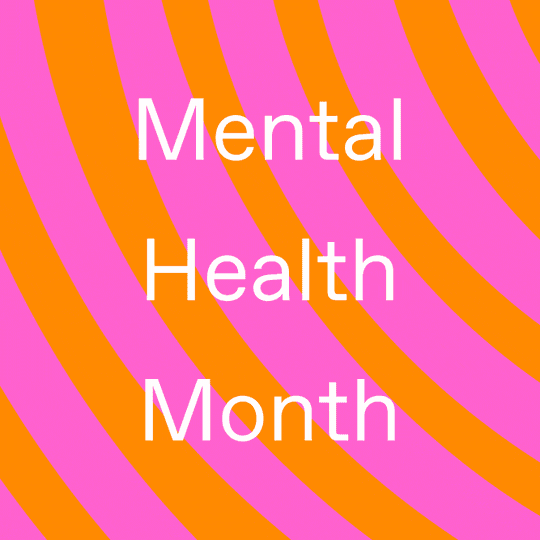
Hey, Tumblr! 👋
Today marks the first day of Mental Health Month. Just like last year, we wanted to take up a bit of your dashboard real estate to talk about something important: you.
“Mental health” covers a broad spectrum of complex illnesses and emotions. It’s not always a cut-and-dry diagnosis, or something that goes away when you practice self-care. It can be difficult. It can feel like an uphill battle, especially after the year we’ve had. One of the ways we can move forward is by talking about it. We want to help facilitate that.
We want you to know that there are resources out there. There are people to talk to if you need someone to talk to, and there are organizations to look into if you want to help others.
NAMI (@namiorg and @oktotalk), the National Alliance on Mental Illness, is the largest grassroots mental health organization in the U.S. Residents can dial 800-950-NAMI Monday through Friday, 9 a.m. — 6 p.m. ET.
The It Gets Better Project (@itgetsbetterproject) has one mission: uplift, empower and connect LGBTQ+ youth all around the globe. They have a list of over 1,000 resources for LGBTQ+ youth who are struggling with their sexuality, their families, their friends, or anything else. They want to remind you that you do not have go through anything alone.
The Born This Way Foundation (@bornthiswayfoundation) is committed to supporting the wellness of young people and empowering them to create a kinder and braver world. Their goal is to encourage kinder communities, improve mental health resources, and more positive environments both online and off.
Today we want to help you set up your own support system right on your own Tumblr. Some place where you can be honest and open and true. If you feel comfortable with it, we have two questions for you: what are you doing today to make life easier for yourself? And if you feet up to it—if you feet like you are in a good enough place yourself—what can you do to make life a little bit better for someone else?
Don’t forget, we have a whole directory of resources and prevention services that are open for people from all over the world right over here in our Help Center.
14K notes
·
View notes
Photo

Begin your journey here! Click links to go to the relevant tags! Journals can be found HERE.
To learn more about me, check out my About Me post here!
Unit 2: Learning via the Internet
Unit 3: Educating via the Internet
Unit 4: Communicating via the Internet
Unit 5: Broadcasting via the Internet
Unit 6: Socializing on the Internet
Unit 7: Emotion and the Internet
Unit 8: Motivation and the Internet
Unit 9: Perception & Attention to the Internet
Unit 10: Decision Making on the Internet
Unit 11: Development & Aging with the Internet
Unit 12: Personality on the Internet
Unit 13: Clinical Psychology on the Internet
Unit 14: Conducting Research on the Internet
BONUS: STUDY BREAK! Playlists, videos, fun websites, and more!
2 notes
·
View notes
Text
About the Author:
Hello! I haven’t formally introduced myself, but I thought it might be fun if we get to know each other a little better by me answering some cool “About Me” questions I found!
1. What is your name?
Alyssa
2. How old are you?
I am 21 years old!
3. What are you studying in school?
I am currently about to graduate with a B.S. in Psychology and a certificate in German!
4. What is one thing you cannot leave the house without?
My phone, sadly. I need it for directions and my music! I love listening to music while working out or walking to class.
5. What is your favorite brand of makeup?
Probably Kat Von D. But I still love e.l.f.! Both are cruelty free/vegan brands!
6. What are your favorite flowers?

7. Coffee or Tea?
Tea! Preferably unsweetened! I like all different kinds of teas.
8. What is something you like to do in your free time?
I actually love video games and anime! I recently discovered that I am incredibly fascinated by learning how video games are made and characters are designed. It is because of this that I have an immense love of costume making and designing my own characters.
9. What is your favorite television show?
That goes to AMC’s Preacher! It’s also one of my favorite comic books!
10. Marvel or DC?
MARVEL!
11. What is one skill you would like to learn?
I really want to learn American Sign Language (ASL).
12. How many languages do you speak?
Two! English and German!
13. Where is your favorite place on earth?
Probably Lake Tahoe, California...
14. What kind of music do you like to listen to?
What kind of music do I not like to listen to? That’s easy...I’m not the biggest fan of country, but other than that I really can listen to anything. As I type this, I am listening to classic rock!
Hope that’s enough for us to get acquainted! <3 Thanks for checking out this post!
0 notes
Text
Unit 14: Looking Forward on the Internet
This is the final unit of the course! A bittersweet end indeed!
During the first part of the unit, we reviewed how the internet can answer questions with statistics. I chose to examine the question “Can Wikipedia hits provide data about health epidemiology?”
The answer was a resounding “yes!” according to an article by McIver & Brownstein from 2014. I discussed the results in my post here. What they ended up finding was that their data on website hits matched up with predictions made my the CDC’s incredibly accurate but also incredibly slow calculations. For future applications, learning about the health epidemiology of a population could be as easy as observing what people are searching on the internet.
If you’re as much of a nerd about statistics as I am, you can take a look at this Internet Page Analyzer! I find this kind of statistics to be really fascinating, plus some of these numbers are absolutely astounding!!
During the next part of the unit, we learned about predictions from Steve Jobs, Nikola Tesla, and Arthur C. Clarke about the internet from various points in time. I found all of these incredibly fascinating and some were almost scarily accurate (just take a look at what Tesla predicted about the future of communication). My three predictions that I made about the Internet and the future were that we will have...
A home computer that costs under $100 and is virtually indestructible. With the growing number of people with children who need access to the internet and the rough and tumble play of little ones, we will likely need something that can be a good family computer that won’t cost thousands of dollars to replace.
Roaming Wifi Hotspots. Cars, planes, bicycles, anything you can imagine will have the ability to give off a wifi signal. This will increase coverage and access to internet for people without a router or internet access at home.
Wearable medical tech that can increase first-responder rate and never have people be truly alone in a medical emergency. In what will be a questionable breach of privacy, people with medical conditions can wear devices that track their heart rate, blood pressure, consciousness, blood sugar, etc. and share this with local hospitals. This information can be used to check in on people with chronic health problems and increase the likelihood that they will be helped in the event of an emergency.
Speaking of future technology and the internet, I heard about a recent movement in my own research referred to as Biohacking! I find this practice to be a little questionable, but some of the results are quite interesting. Take for example this news story I found about a man who implanted his transit card chip into his hand! I talked a little more about Biohacking itself in this post. I see technology going in more accessible and interesting directions as we progress as a society! I hope the internet can remain free and open to everyone! That’s what makes it so great!!
The next assignment I had to do was a make up assignment. I ended up making up a review sheet that I did not finish due to an illness, and I feel like I performed much better on it than I did the first time around! I shared the second part of the assignment, an update on my Term Project (this blog), in a post on our class discussion board.
Our next assignment was to turn in our Term Project, but we will discuss why I held off on that later...
As per our instructor’s request, I filled out the survey for the course. I plan to share more of my thoughts on the course as a whole in a future post, so be on the lookout for that!
Next, I filled out our final review sheet and turned that in!
Now, onto the issue of turning in my term project...
I’ll do that after I share this final post! I just want to thank everyone who enjoyed this blog, followed me, and liked my posts. This has been an incredible experience and I have enjoyed sharing what I have been learning! Thank you all! I’ll be seeing you all, please enjoy this blog and share it if you want to!
See you all around!
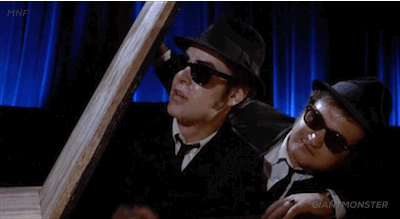
1 note
·
View note
Link
Biohacker, a name given to a class of people who study DIY biology, Meow-Ludo Disco Gamma Meow-Meow (yes that is his real name) was fined for implanting part of his Opal transit card into his hand. He had the chip from the card filed down to be small enough to be implanted into his hand by a professional piercer and the chip is still able to function as a normal transit card would.
0 notes
Link
Biohacking is something that I heard about on NPR when they interviewed a man who implanted part of his transit card into his hand. This type of DIY biology operates outside of traditional grants and academics that you might expect from most Biologists and Scientists. This is both concerning and amazing as more people are encouraged to experiment beyond the boundary of academics and review boards. I think we can all see why this might make some of us nervous, though.
#unit 14#looking forward on the internet#biohacking#news article#original post#tumblr tags#science#technology#biology#biohacker
0 notes
Link
This is a cool site to check out if you like numbers/statistics like I do! Ever wondered how many Instagram photos were uploaded today? The answer might surprise you!
1 note
·
View note
Text
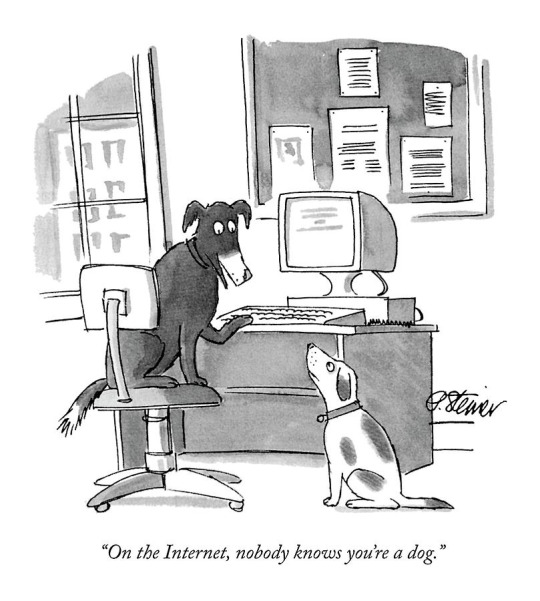
This was a picture that was on all of our review sheets in this course! I came to be very familiar with this piece of art. The history of it is actually kind of interesting. Check that out here!
1 note
·
View note
Link
Hard to believe that it’s been so long since the Apple iPhone was introduced to the world, it feels like over half of my friends own one! Even I own one now! Take a stroll down memory lane and enjoy this video...
#unit 14#looking forward on the internet#video#coursework#tumblr tags#youtube#steve jobs#iphone#apple
0 notes
Photo
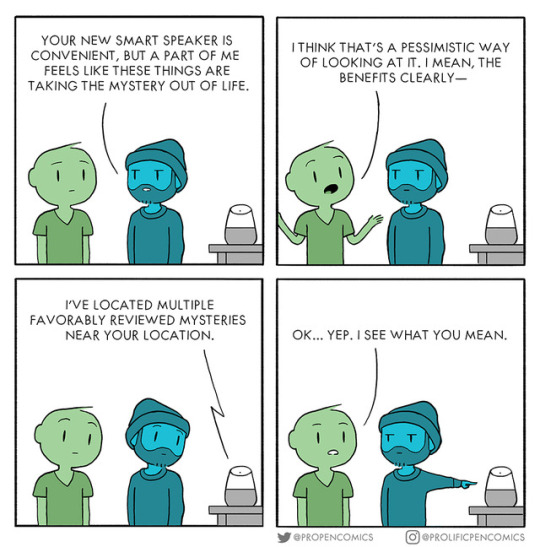
Smart Speaker Mysteries.
644 notes
·
View notes
Link
Arthur C. Clarke predicted in 1976 with surprising clarity that we would have machines that we would be able to communicate with and do any number of things like shopping, watching the news, and reading books. To him, traveling in order to be face-to-face would soon be for pleasure and not necessity. People would be able to communicate instantaneously regardless of where they were in the world.
#unit 14#looking forward on the internet#video#coursework#tumblr tags#technology#computers#youtube video#1970's#the future
0 notes
Quote
We shall be able to communicate with one another instantly, irrespective of distance. Not only this, but through television and telephony we shall see and hear one another as perfectly as though we were face to face, despite intervening distances of thousands of miles; and the instruments through which we shall be able to do this will be amazingly simple compared with our present telephone. A man will be able to carry one in his vest pocket
Nikola Tesla on future wireless communication (1926)
#unit 14#looking forward on the internet#quote#coursework#tumblr tags#nikola tesla#communication#the future
1 note
·
View note
Text
Unit 14: Analyzing page views to track health epidemiology data
According to a recent study by McIver and Brownstein (2014) published as an open access article here, statisticians may be able to use visits to Wikipedia pages related to influenza to model the same predictions during flu season as more reliable, but comparably slower, models from the CDC.
If you want to get an idea for the type of software they used, Wikipedia’s data is all open-access and can be viewed by anyone. Anyone can check page views/visits with a tool such as this Pageview Analyzer.
#unit 14#looking forward on the internet#coursework#tumblr tags#public health#applications of the internet
0 notes
Text
Unit 13: Clinical Psychology on the Internet
We began this week’s lesson by watching this video from Professor Gernsbacher about Internet Addiction. After the video we were supposed to write a post detailing how we would answer someone who asked us the following question: “Isn’t that course all about Internet addiction and other negative effects of the Internet?��
My answer to this person rested on the theory that in order to understand things like mental health and the internet, we also need to study things like mental illness and the internet; however, these things do not need to go hand-in-hand. A person can learn about only the good things about psychology, they can read books only about people who are mentally well and completely ignore abnormal psychology and mental illness, but then you miss over half of the picture. The reason we know that mental illness is an illness is because we have this contrasting picture of mental health and wellness. I for one am glad that the field of psychology is shifting into focusing more research on mental health and wellness as opposed to mental illness. It seems like a step in the right direction for a lot of reasons.
The next task in the unit was to choose an article to read about a randomized controlled trial. According to Wikipedia, a randomized controlled trial (RCT) is “a type of scientific (often medical) experiment which aims to reduce bias when testing a new treatment.” This means that the people involved will be randomly assigned to a test or control group and will be receiving treatment or no treatment under observation.
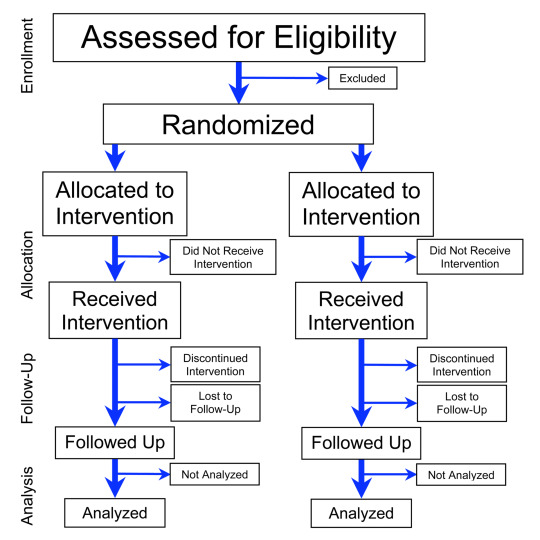
This image, taken from the Wikipedia page for RCT (Source)
The article about a RCT that I read was published by Albertson et al. in 2014 titled “Self-Compassion and Body Dissatisfaction in Women: A Randomized Controlled Trial of a Brief Meditation Intervention.” In this trial, women were assigned to two groups, a group which would undergo mindfulness training in the form of podcasts that they would listen to, and a group that would be on a waitlist (called a waitlist control). What they found from providing these tools to women is that there was a significant decrease in body dissatisfaction and other related negative factors as well as an increase in self-compassion.
During this unit we also learned about Cognitive Behavioral Therapy (CBT). I defined it in this post. We then learned about CBT though this video by the Mental Health Charity. Through our readings in class, we learned that Internet-based CBT is just as effective as in-person CBT and is much better than doing nothing to improve your mental health. CBT can be used to manage daily stresses, anxiety, reduce symptoms of depression, and improve resilience. If you are a student of the University of Wisconsin-Madison, then you have free access to an app called SilverCloud. SilverCloud is an only CBT app.
Finally, in our group chats we discussed our Term Projects and if anything was bothering us about being able to finish them or if we were putting them off for any reason. If we had any worries, our other group members could help us to alleviate these stresses by playing amateur CBT therapists and helping us with the skills we have learned in this chapter. In the end, I preferred to walk people through the SMART route if they were procrastinating. This is my favorite way to tackle large goals that seem almost too much for me to handle. In the end, I know I procrastinate, so I like to help people who have that tendency as well. I also talked about how I apply the different parts of the SMART goal setting in this post here.
#unit 13#clinical psychology on the internet#journal#tumblr tags#long post#cbt#cognitive behavioral therapy#silvercloud#rct#randomized controlled trial#clinical psychology#psychology
0 notes
Photo
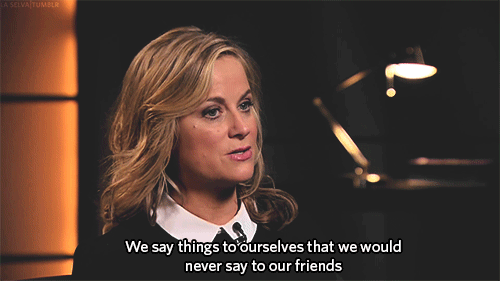
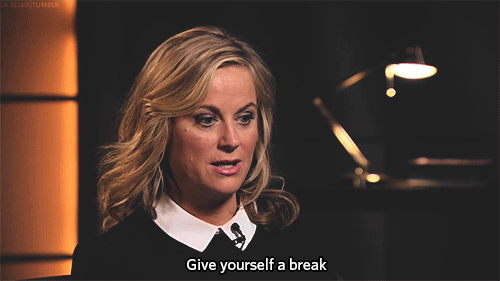
Words of wisdom from the charmingly intelligent Amy Poehler (Link to full interview)
#unit 13#clinical psychology on the internet#reblog#gifset#words to live by#tumblr tags#amy poehler#self-care#self care#selfcare
12K notes
·
View notes
Text
self-care instruction manual
forgive yourself : it’s okay if you didn’t wake up early, go for a run, or finish that assignment. you’re only human
start slow : don’t set your expectations too high when you’re just starting off
keep learning : getting to where you want to be is a process. don’t expect perfection overnight
be kind to yourself : you’ll make mistakes along the way, but don’t let that stop you
65K notes
·
View notes